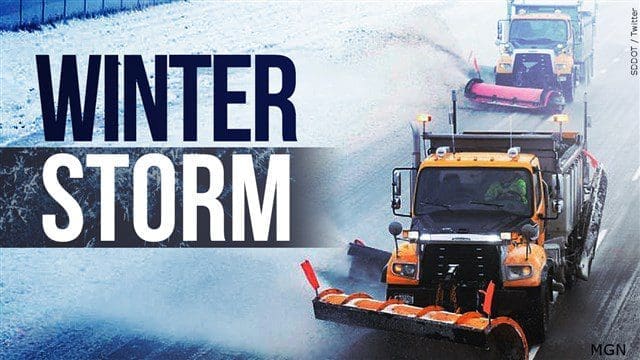Kansas- Winter officially begins Wednesday, Dec. 21. As if to herald the event, a winter storm system will be moving into Kansas on Wednesday, bringing frigid temperatures and snow.
Accumulating snowfall is expected from Wednesday night through Thursday across the state with the potential for four inches of snow in some areas by Thursday.
In addition to snow, arctic air will be moving into the state and winds will become strong out of the north and northwest. Highest gusts on Thursday are expected to be between 40 and 45 mph. The strong winds will cause visibility issues due to blowing snow and will create life-threatening wind chills in the -40 to -50 degree range, which should occur Friday morning.
“Every year, Kansans must face the challenges of winter snowstorms,” said Gov. Laura Kelly. “The key to meeting those challenges is to be prepared. I urge all Kansans to remember the lessons learned from past storms and take measures to make sure their families are ready by making a home emergency kit and emergency plan.”
A home emergency kit should include a battery-operated radio, flashlight and extra batteries, extra blankets and warm clothing, nonperishable food, high-energy snacks, and drinking water, at least one gallon per person per day, for a minimum of three days. For more information on emergency kits, go online to https://www.ready.gov/kit.
It is also advisable to keep an emergency supply kit in your car that also includes jumper cables, flares or reflective triangle, ice scraper, car cell phone charger, blanket, map, and cat litter or sand (for better tire traction).
Avoid travel if you can. If you do travel, make sure someone knows your travel plans and make sure your vehicle has a full tank of gas during extreme cold situations so that you can stay warm if you become stranded. Ensure your mobile phone is charged, and make sure your car’s emergency kit is up to date. Whether at home or on the road, listen to your local radio and television stations for the latest weather information.
If you do become stranded in a winter storm, do not panic. Stay in the vehicle, keep fresh air circulating through a downwind window, run the motor sparingly, turn on the dome light, and make sure the vehicle’s tailpipe is clear of snow. Stimulate circulation and stay awake by moving arms and legs. If you leave the car, work slowly in the snow to avoid overexertion and the risk of a heart attack.
If you have a cell phone, call a Kansas Highway Patrol by dialing *HP (47), or *KTA (582) while on the Kansas Turnpike.
For a complete list of items for an emergency kit for your home and vehicle, go to www.ready.gov.
Prepare ahead of the storm so that your livestock are taken care of:
- Provide appropriate shelter from the elements. Livestock can generally tolerate cold temperatures, but wind, rain, or snow will require a greater expenditure of calories. With that in mind, be sure they have a way to get out of the elements, especially the wind. Blankets can help protect horses, but a structural shelter with proper ventilation and dry bedding is the best method of protection.
- Consider the amount and quality of feed. Besides taking shelter, livestock keep warm by expending energy, which means they need to consume enough calories to heat themselves.
- Ensure access to water. It is crucial that your herd has access to fresh and unfrozen water. Tank heaters or heated buckets can help keep water at a temperature your animals are more comfortable drinking. Livestock will not drink adequate amounts of water if it is near freezing, and drinking enough water is important to your animals’ health and well-being in winter months.
For information on pet care go to https://www.avma.org/public/PetCare/Pages/Cold-weather-pet-safety.aspx
State road and travel conditions are available at the Kansas Department of Transportation’s website – www.Kandrive.org. Impacts to traffic are updated 24/7, including maintenance and construction activities, winter highway conditions, flooded roadways, incidents and crashes affecting traffic and closed highways. You may also call 5-1-1 for Kansas road conditions, outside Kansas call 1-866-511-5368 (KDOT).













